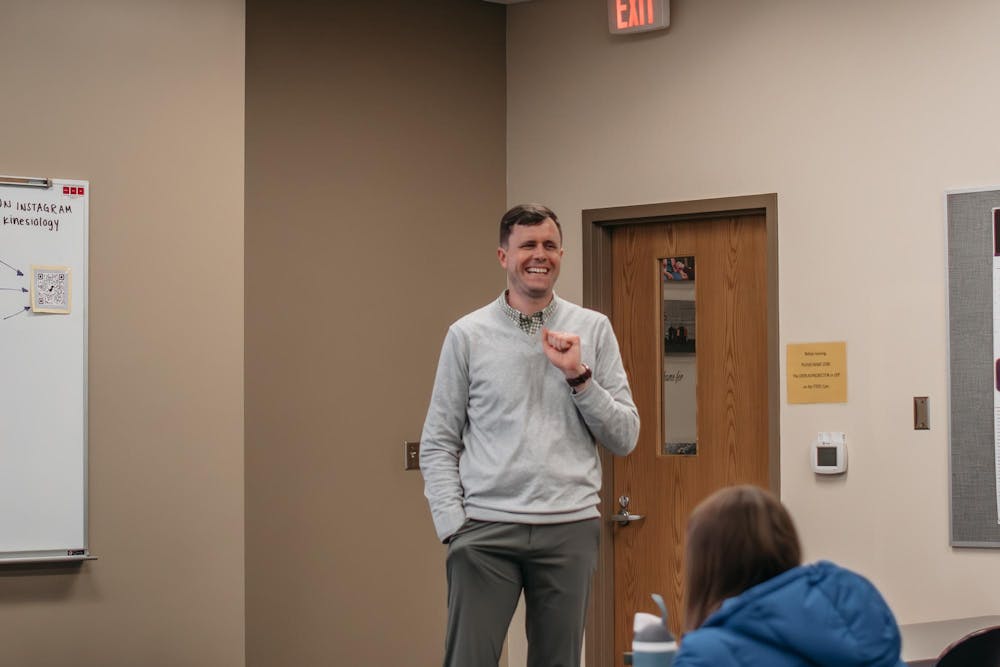During the spring season, some people like to plant flowers, some like to hike in nature.
Others aspire to run toward the finish line.
Brandon Dykstra is the assistant professor of kinesiology and chair of the Kinesiology Department at Taylor University. He is also known for leading students in the famous marathon course each spring semester.
Dykstra began teaching at Taylor in the spring of 2019 while finishing his doctoral degree. He knew one of Taylor’s kinesiology professors from graduate school, who recommended him to teach at Taylor.
“I knew that coming from my experience as a student, all throughout grad school, my ultimate goal was to teach at a Christian liberal arts institution,” Dykstra said. “So ideally, a relatively small institution that really cared about the liberal arts at high academic expectations and all of that with sort of a genuine, motivated interest to do those things out of love for the Lord.”
Dykstra has enjoyed studying physiology and exercise science since undergraduate school.
One of his fascinations in the field is the design of the human body and how it functions in different ways in its physical being. He enjoys not only teaching his students about exercise but also having them exercise in class.
One of the main values that Dykstra aspires to teach is the importance of physical health and activity. It is often something that is undervalued in a secular society, Dykstra said.
“My kids, Asher and Jane, this is all they know, living around here,” Dykstra said. “But my wife and I are both from Michigan. We both really enjoy (it) here.”
The marathon class has been offered every spring semester since Spring 2021. Dykstra started developing the plan for it a year prior and successfully received approval from the department.
Students in the class are given a weekly training plan. At the end of the semester, students run a marathon together.
In the past four years, the marathon has taken place in Cape Girardeau, Missouri; the Kenosha Marathon in Kenosha, Wisconsin; the Kentucky Derby Festival Marathon in Louisville, Kentucky; and this year, the class will be going to the Glass City Marathon in Toledo, Ohio.
“The reason I started the class is because I think there is great value,” Dykstra said. "This is true of exercise in general; but particularly, there’s great value of exercise in general, there’s great value in really challenging exercise. And then, there’s something specific about not just sort of the physiological challenge of running, but of endurance exercise, so things that last for hours.”
The class comes with difficult exercise that lasts for long periods, which interests many of the students who enroll in it. They find value in these challenges and grow in more than simply physical health, such as the realization of what they are capable of accomplishing.
During the training process for the marathon, students train individually within the week, although they may choose to run with friends. On Saturday mornings, the class meets to run the longer distances together. The class is designed to emphasize teamwork and community as well as individual ownership.
“It’s not always fun,” Dykstra said. “It’s not always enjoyable. You’re out in the middle of nowhere for hours at a time. I don’t believe that everyone needs to run a marathon. I think that everyone can run a marathon, and people are often surprised by that.”
Dykstra’s favorite part about the semester is the afternoon and evening that follows the marathon. Having a great sense of accomplishment, all of the students share meals and enjoy their time together.
His encouragement for aspiring runners is to not view a marathon as a barrier exclusive to strong athletes. Anyone can run a marathon if they are determined to do so. However, one cannot simply step out and accomplish it quickly.
“You do have to plan for it,” Dykstra said. “And you have to discipline yourself to do it. Really practical advice is programming it into your schedule. Putting training on there is important. And part of that might be sacrificing other things or other opportunities, which is not always a good decision to make. That’s why putting off a marathon until a different time is totally fine. But it does take time and does take energy.”
The students are both looking and running forward to the end of the semester, when they will receive the reward for all of their effort.



